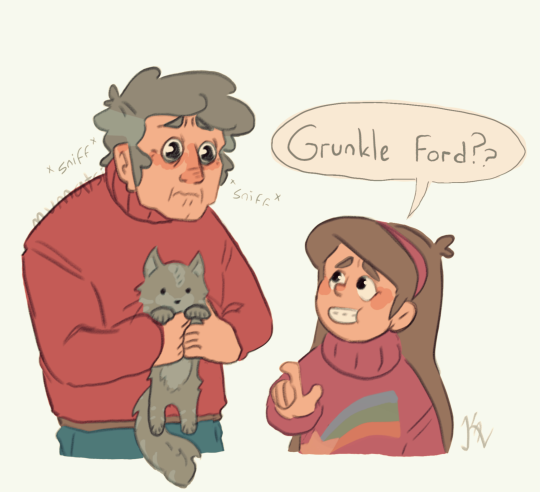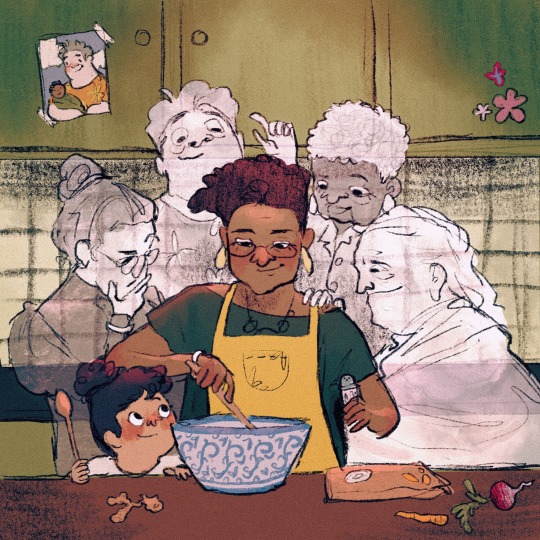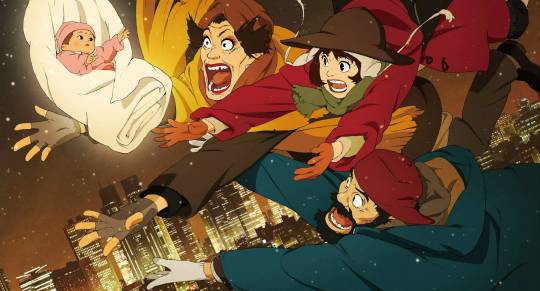#family of origin
Explore tagged Tumblr posts
Text
Some are put in the position of emotionally caring for an adult early in their lives at a time they themselves need more than anything to have their own inner world mirrored back to them.
To be seen as a subject with an interiority, not merely as a narcissistic reflection of the other.
Until reorganized, this template orients the way we see ourselves and engage in close relationship.
In these early configurations, the little one’s sense of self becomes tangled up in the other’s moods, anxiety, and injured self-esteem.
The job of the little one is shifted from unstructured play and discovery into tending to the unlived life of a caretaker, a task that is not designed for a young nervous system, nor for a tender little heart.
If interested, we can explore how this template might be at play: in our phobias around having/ expressing needs, in the fear around disappointing someone, in the hesitation around allowing another to matter.
In the terror of relationship, on the one hand, and in the painful longing for it on the other. In the existential confusion about where we end and the other begins. In the ancient conclusion that caring for another requires primordial disavowal of our own psyche, body, and heart.
Having come to see our own self-worth through the changing psychic states of those around us, we find ourselves wondering: Have I disappointed them? What can I do to make them feel better? Should I take more responsibility for the unfulfilled longing in their hearts? They are upset, surely that is somehow traceable back to me, right? I’ve failed somehow, right?
As a little one longing for any sort of empathic connection, we’ll do anything to receive even a limited amount of psychic (and physical) holding.
Accessing, illuminating, and untangling the tentacles of this template can go a long way in healing chronic feelings of shame and unworthiness, where we begin to differentiate our worth as a person from the moods, suffering, and unlived life of others.
To withdraw the projection of our own basic goodness from others and locate it inside ourselves. This withdrawal is a great act of kindness – for ourselves, the other, and for the world.
It is by way of this disentangling that we can truly love ourselves and others and act from the radical force of true compassion, not merely re-enact the old pathways of self-abandonment and empathic failure.
- Matt Licata

4 notes
·
View notes
Text
I was raised in the dark, so the light feels scary.
I was raised in the dark, so the light feels strange.
I was raised in the dark, so the light is sometimes confusing and overwhelming.
I was raised in the dark, so my parents don’t understand the light.
I was raised in the dark, so I had to leave my home behind to be in the light.
I was raised in the dark, but I deserve the light.
#self care#self love#mental health#recovery#therapyworks#positive mental attitude#kindness#spread kindness#kind notes to self#recovering people pleaser#family of origin#family trauma#chosen family#letting go#letting it out#letting it go#litany#my poem#poems and poetry#poets corner#my poetry#poetry time
2 notes
·
View notes
Text

She got him a six fingered kitten
#gravity falls#mabel pines#stanford pines#stanford#ford pines#mabel#gravity falls art#gravity falls fanart#sweater duo#silly family activities#my art#original art#digital art#mumatsi#do not repost#do not reupload
28K notes
·
View notes
Text


Arsonist's Lullaby
#atla#zuko#avatar the last airbender#azula#ozai#atla ursa#fire nation royal family#fire hazard siblings#arsonist's lullaby#atla art#atla fanart#atla azula#azula art#azula fanart#zuko fanart#fire lord zuko#zuko alone#prince zuko#atla zuko#zuko art#ponytail zuko#fire lord ozai#atla ursa fanart#princess ursa#atla ursa art#atla ozai#hozier#fire nation#This is the very first ATLA artwork I ever made. It's originally six pages long. These are the only properly finished ones#I've been wanting to share this for so long! I can't believe it's finally time for you guys to see it
28K notes
·
View notes
Text
Video Poem: A Familiar Reflection by Mark Tulin
Video Poem: A Familiar Reflection by Mark Tulin
A Familiar Reflection was first published on Scrittura.
1 note
·
View note
Text
Back when I was first agonizing my way through coming out as nonbinary to my family of origin, I kept thinking: it would be so much easier if they were either perfect or terrible. If they were perfect, no problem. If they were terrible, I could just cut them off and not deal with all the trouble of navigating my relationship with them.
I didn't really know how to deal with their acceptance being a process, and it was so hard!
When I was coming out, I used a lot of scripts from sources like Captain Awkward, which were simultaneously useful and counterproductive: useful because they gave me SOMETHING to say, counterproductive because they sometimes presupposed a universe where I would choose not to have a relationship with my family of origin, who, whatever issues we may have (and boy do we have issues), love me without condition or exception & are some of the most welcoming and loving people I know.
It continues to be a work in progress, but nowadays they use my chosen name more often than not, & my mom, at least, calls me her child rather than her [gendered child term]. (Pronouns are a whole different issue bc we're primarily Russian speakers)
My maternal grandmother went from "I think it's a sickness" to "My dear / straight or queer / changing your name / my love is the same." I never really came out to my paternal grandparents because their English was much worse than my maternal grandmother's, and I didn't have the capacity to talk about gender in Russian. I loved them all with my entire heart, regardless.
And at my grandfather's funeral, I allowed the rabbi to call me by my given name, because I was named after my grandfather's parent, and it felt like an important compromise to make. (I also don't have the same relationship to my given name that a lot of trans people have; obviously for others that kind of compromise would be a nonstarter)
Anyway, I don't really have a conclusion to this, but we don't really see these kinds of things in media. Especially the immigrant aspect, I feel like.
I feel like we always see parents who are 100% super supportive allies, or parents who are horrible and cruel. At least in media or in the most popular stories. But I feel like that ignores just how many people have parents where you just have no idea? And even if you think they’ll accept you on a surface level, you don’t know if they have a breaking point. Especially if you need to go on hrt, or request they change the way they think about and refer to you. Sure they’re liberal and all, or centrists, or “tolerant”, but how far does that stretch?
I think most closeted LGBT+ kids live like this, wading around in the grey area. I’d like it of more of us knew that was normal, I’d like if we talked about it more.
77K notes
·
View notes
Text
Headcanon: Jason, after coming back from the dead, decides to fuck with Bruce for revenge and also because it slaps, but mostly for revenge ykwim
Bruce blames coffee and lack of sleep for the fact that the pizza delivery boy looks like Jason, the club bouncer looks like Jason, the clerk in Damian's school looks like Jason
Jason: here's your pizza, mister *shoves it into Bruce's face*
Bruce: 😵💫😵💫😵💫 can I ask your name
Jason: Percy, but everyone just calls me Purse. Like in "cut purse"
Bruce: *under his breath* jesus, you even SOUND like him
Jason, wide innocent eyes popping out of his chiseled man face: you okay dude?
Bruce, convinced he's finally lost his mind, but still holding on to the "illusion": Do you want to come inside?
Jason, deadpan: dude you're rich white and famous, you really think imma let you take me inside your gargantuan Gothic mansion? Being killed one time's enough
Bruce, turning around: *wHaT dId YoU sAy*
#jason todd#bruce wayne#batman#red hood#batfamily#dc comics#crack fic#dc fanfiction#funny#humor#headcanon#batfam headcanons#incorrect quotes#batfic#batboys#robin#batbros#batkids#batsiblings#incorrect dc quotes#batclan#batman family#original content#original
5K notes
·
View notes
Text
Sometimes family is just a suicidal terrorist, a tired henchman and a kid with a funny hat

#sevika#arcane season 2#arcane s2 spoilers#jinx#isha#found family#arcane#sevika is so much more then a henchman#but its less funny if it says tired mommy with big metal arm please throttle me#originally I mistyped kid as kit#isha is a kit thou
8K notes
·
View notes
Text
don bluth films occupy a weird space because he's both inarguably an auteur who directs very strange, earnest, often "ugly" films but also a guy who near exclusively made movies for 8 year olds in the home video era. so basically everything he's ever done is a grimy, dreamy rumination on death and spirituality and has a direct to video sequel called something like secret of nimh 2: mrs. brisby's holiday adventure
#this happens to a lot of family films obviously#but i can't really think of another director that has a familiar divide between a very stylistic and thematically specific body of work#and direct to video kids movie-quality sequels#the sequels to musker and clements films don't really have the same severe difference in tone to the originals#what happened to neverending story didn't happen to every wolfgang peterson movie#etc
7K notes
·
View notes
Text
Duke: Would you slap your favorite brother for a million dollars?
Damian: Yes.
Tim: Yeah. Sorry, Dick.
Jason: I would slap Dick for free.
#dc comics#dc#comics#character dialogue#original dialogue#character dynamics#batfam#batkids#batfamily#batbros#bat brothers#batsiblings#found family#comic books#funny#humor#duke thomas#the signal#damian wayne#robin#tim drake#red robin#jason todd#red hood#dick grayson#nightwing#batboys#hypothetical#family dynamics
5K notes
·
View notes
Text
When we look at our lives in light of scripture and the call of God, we realize that we have learned many things from our families of origin, from our schools and classmates, from our associates at work and from the omnipresent media that have shaped us - mis-shaped us, really - in the image of human brokenness rather than the image of divine fullness. The new birth [promised in baptism] provides us with the gift of making a break from the effects of that mis-shaping process and its hold on our lives… We are children once again, sitting with and learning to imitate the character and mannerisms of our heavenly Parent, who is present to us through his Holy Spirit: “all of us, with unveiled faces, seeing the glory of the Lord as though reflected in a mirror, are being transformed into the same image from one degree of glory to another�� (2 Cor. 3:18).
David A. DeSilva, Sacramental Life: Spiritual Formation through the Book of Common Prayer
1 note
·
View note
Text

for anyone that doesn't know, i recently started school again! (that's why ive been so mia) so ill be posting class projects whenever i finish them,,, this was a figure drawing assignment :)
you can get a print of this here!
#along with moving and starting school again‚ i had a bunch of family and health stuff thrown my way at the start of this semester‚‚#so im slowly catching up on work from this past month hsbdhdjf#my art#artists on tumblr#art#illustration#uhh i think that's all my original art tags#im really happy with how this piece turned out!!! :D#during critique someone mentioned how this felt like a representation of creative burnout and i was like omg. felt.
14K notes
·
View notes
Text

Family Recipe
#art#illustration#character art#artists on tumblr#original characters#cooking#generational#family#generations#mixed family#kids lit#mourning#death#life after death#Procreate
23K notes
·
View notes
Text
Now that Ghibli's new movie is coming out soon, I've been thinking about anime films and wanna talk about my favorite animated movie ever, Tokyo Godfathers.

TG is a 2003 tragicomedy by Satoshi Kon, following three unhoused people––an alcoholic, a runaway girl, an a trans woman––who find a baby in a dumpster and set off across Tokyo to reunite her with her parents.
If you like the sound of that, go watch it because the rest of this post is spoilers and I have FEELINGS about this movie.
URGHH, the fact that only two moments of true kindness, generosity, and care given to the three protagonists without any expectation of reciprocity are given by a Latin-American immigrant couple and a drag club full of queens and trans women. The fact that, despite her loud and dramatic personality, Hana is the glue that holds the team together and the heart of the whole movie. The fact that this movie pulls no punches at showing the violence and inhumanity committed by "civilized Japanese society" against the unhoused. The fact that Miyuki craves to be loved by her parents and ends up seeing Hana as her true mother. The fact that Miyuki starts off accidentally using transphobic language against Hana, but slowly begins calling her "Miss Hana" out of respect. The fact that, according to Kon, Hana's role in the story is as a mythological trickster god and "disturb the morality and order of society, but also play a role in revitalizing culture." The fact that Hana so desperately wants to be part of a true family, yet is willing to sacrifice her found family so they can be with their own, and is rewarded for her good deeds in the end by becoming a godmother. The fact that, throughout the movie, wind and light have been used to signify the presence of god's hand/influence (this movie's about nondenominational faith––faith in yourself, faith in others, faith in a higher power. Lots of religious are referenced, such as Buddhism/Hinduism, Christianity, and Shintoism), and in the climax of the film, as Hana jumps off a building to save a baby that isn't hers, a gust of wind and a shower of light save her from death. The fact that god saves a trans woman's life because she proved herself a mother, and that shit makes me CRY.
#ramblings#long post#not art#personal#it's the ultimate found family movie#not without its problems. i really dont like its depiction of mental health#for a movie that does an otherwise great job spotlighting the unhoused crisis in japan and its society's oppressive distain towards women#and queer people. it really drops the ball on depicting one of the biggest contributors to the crisis#but otherwise this movie is so fucking full of love and kindness and second chances and how fucking good queer folks and poc are#it blows my mind that this film came out in 2003 and the main protagonist is a trans woman who's just the fucking best#the recent gkids dub is REALLY good by the way! they got shakina nayfack; a trans va; to voice Hana!#the dub made great strides to undo a lot of the original misgendering and mistranslations#also its a christmas movie#also the ost was done by the band that did earthbound's ost
10K notes
·
View notes
Text

POV: you just interrupted the Skywalker twins at the space gala
Just a little post to say thank you for a 1000 followers!! I never thought that posting my little pictures on tumblr would get so much love 💕
#art#artists on tumblr#fanart#star wars#star wars fanart#digital art#star wars original trilogy#illustration#luke skywalker#luke skywalker fanart#leia organa#princess leia#luke and leia#leia organa fanart#planet: coruscant#I wish I could have been bothered to do the background properly but oh well#space twins#skywalker family#skywalker twins
9K notes
·
View notes